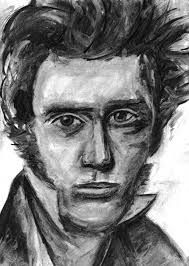The Gospel is a Gospel of offense. Christ in the assumptio carnis doesn’t only explain God to us from within Himself and the triune life (Jn 1.18), but He explains who we are  as fallen human beings vis-à-vis the holiness and person of the living God. The Gospel doesn’t allow us to remain comfortable with our sins; the Gospel doesn’t allow us to find companionship with our evil, dark and depraved hearts. The Gospel is the Way, the TRUTH, and the Life; as such, it puts us in our place. For the natural [hu]man this causes squirming, it challenges our base desires at their very root; the desires we’d rather live our live-long days with. But the Gospel pronounces a disruptive and loud, No! Gracefully, the Gospel doesn’t just take us to the dark side of our fallen condition; it dialectically, and at the same time, elevates us into the Light and Life of God.
as fallen human beings vis-à-vis the holiness and person of the living God. The Gospel doesn’t allow us to remain comfortable with our sins; the Gospel doesn’t allow us to find companionship with our evil, dark and depraved hearts. The Gospel is the Way, the TRUTH, and the Life; as such, it puts us in our place. For the natural [hu]man this causes squirming, it challenges our base desires at their very root; the desires we’d rather live our live-long days with. But the Gospel pronounces a disruptive and loud, No! Gracefully, the Gospel doesn’t just take us to the dark side of our fallen condition; it dialectically, and at the same time, elevates us into the Light and Life of God.
Read along as father and son duo, Alan and Andrew Torrance explain how this looks in the theology of Kierkegaard:
To analyze Kierkegaard’s position more precisely, there are primarily two ways in which he considered Christ to be offensive. The more obvious of the two ways is that Christ proclaims a deeply countercultural message. While Jesus ultimately brings good news to the world, not everything he says will be immediately appealing, especially to elite members of society. For Kierkegaard, this point should be obvious to any sincere reader of Scripture. The reason Christ’s message is unsettling is that so many of us are content with the shape of our sinful lives. In the grip of “the sickness unto death,” we define ourselves according to our own finite ends in a way that is dead to God and in “the state of deepest spiritual wretchedness.” As Climacus puts it, the sinner exists in a state of imprisonment in which he “holds himself captive,” and in this state, he is oblivious to the sickness that accompanies his overly positive view of his life. When caught up in sin, it is extremely difficult to notice, let alone take seriously, our state of despair. We are happily sick, so when the true world-changing gospel message is spoken into this situation, it cannot simply be taken as a message that supports us in our daily lives. When God assumes human form, God does not settle in with us in our “sickbed,” nor does God comfort us in our sinful ways. Rather, God reveals Godself by acts of revelation that seek to deliver us from sickness. Anti-Climacus writes:
Christianity did not come into the world as a showpiece of gentle comfort, as the preacher blubberingly and falsely introduces it—but as the absolute. It is out of love that God so wills but it is also God who wills it, and he wills as he wills. He will not be transformed by human beings into a cozy human god; he wills to transform human beings and he wills it out of love.[1]
We will pick up with the ‘second way’ next time. Suffice it to say, Kierkegaard is onto what should appear to be the obvious: i.e., as fallen creatures we are more than comfortable with our fallen ways. Indeed, as fallen creatures, we aren’t even really aware that we are in fact, sick; more biblically, dead! As the Christology of Kierkegaard underscores, outwith Christ’s penetration into the soil and slum of our souls, we would simply run head-long, with glee, into the eternal abyss. But God’s love is greater than our blindness; and because God is gracious, He elects our humanity for Himself in Christ, and gives us His vicarious eyes. He gives us His eternal Light that we might see Light, and come to recognize the darkness that we so gleefully inhabit outwith His disruption into our humanity.
As an aside: the aforementioned has another implication. It implicates the way knowledge of God does or doesn’t work. If Kierkegaard’s theology is true on this front (and I think it is), this entails that fallen creatures left to themselves have no capacity in themselves, other than to see their darkness as light. Indeed, left to themselves, fallen humanity will construct God and gods in their light, which in fact, of course, is only their darkness in the end. The fallen creature needs God’s Life to assume theirs; bring their life up into His; and it is then only from that inhabitation that fallen humanity is elevated into a status and capacity, through union with Christ by the Spirit, that they can come to think and speak God’s thoughts Deus dixit (‘after He has spoken’). Natural theology simply doesn’t have the chops to offer a theological ontology/epistemology/anthropology that brings a fallen humanity into a genuine and viable knowledge of the living God. Christ alone remains the only mediator between God and humanity whereby fallen humanity can become adopted and elevated humanity as participants in and with Christ’s vicarious humanity for them/us.
Many other implications to be visited, but this will have to suffice for the moment.
[1] Alan J. Torrance and Andrew B. Torrance, Beyond Immanence: The Theological Vision of Kierkegaard and Barth (Grand Rapids, Michigan: William B. Eerdmans Publishing Company, 2023), 77.